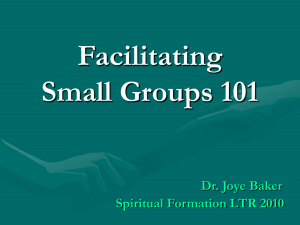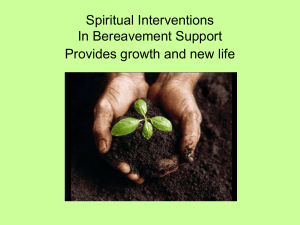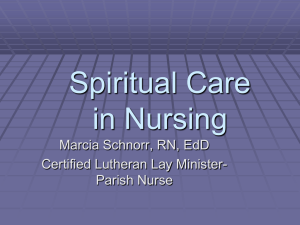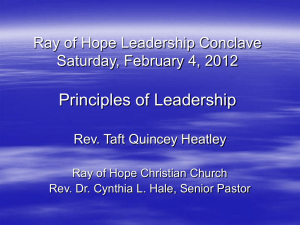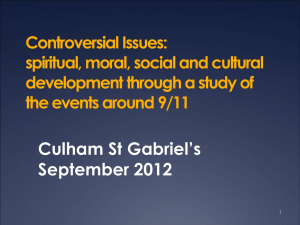God - Bread of Life Church
advertisement
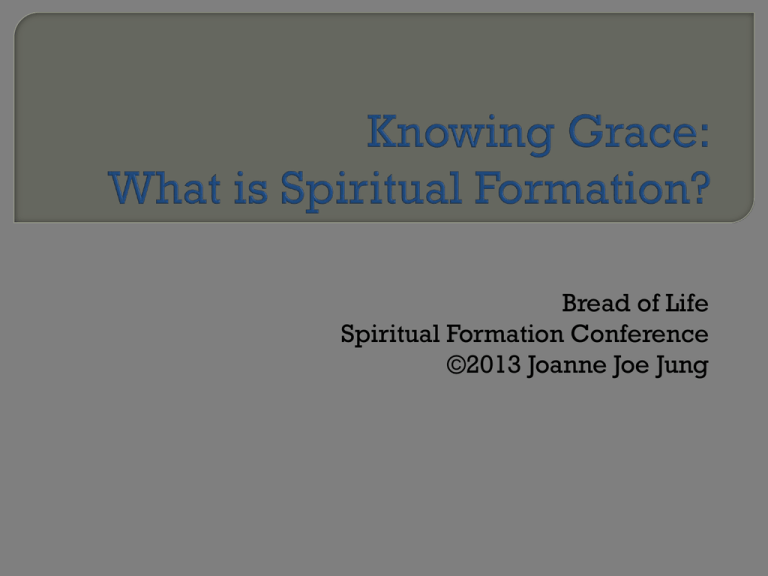
Bread of Life Spiritual Formation Conference ©2013 Joanne Joe Jung A. Types of Sanctification 1. Positional – Christ’s righteousness imputed or credited to us 2. Progressive 3. Perfective– – The believer grows in victory over sin and Christlikeness Believers are changed into His likeness at His return 2 B. Progressive Sanctification is Spiritual Formation C. The Why of Sanctification It is God’s will - 1 Thess 4:3 God commanded it – Heb 12:14 Follows the example of Christ Benefits the community, attracts the lost D. Purpose - Heb 5:12-13 – to become mature Christians with spiritual discernment 3 E. A really good definition Spiritual [trans]formation is the continuing response to the reality of God’s grace shaping us into the likeness of Jesus Christ, through the work of the Holy Spirit, in the community of faith for the sake of the world. Jeffrey Greenman, 2005 4 II. Why is Spiritual Formation important? Our spirits are formed as we take in information about who we really are and as we begin living our lives on the basis of that identity. Christian spiritual formation is coming to the right answer to “Who am I?” and then living our lives on the basis of that proper identity. Smith in Gangel, 248 5 A. The Trinity 6 Father Son Holy Spirit Planned Sanctification Provided Sanctification Performs Sanctification Architect Administrator Applier Ultimate Source Intermediate Agent Direct Agent 1Cor 8:6; Heb 10:10 1Cor 6:11; 2Thes 2:13 1Cor 1:30, 8:6; Eph 5:26; Heb 2:11, 10:10, 14 7 B. The Christ-follower Christian spiritual formation is coming to the right answer to ‘Who am I?’ and then living our lives on the basis of that proper identity. Smith, in Gangel, Handbook on Spiritual Formation 8 Pseudo-transformation One may be capable of performances that benefit others spiritually and yet be a stranger oneself to the Spirit wrought inner transformation that true knowledge of God brings. The manifestation of the Spirit in charismatic performance is not the same thing as the fruit of the Spirit in Christ-like character, and there may be much of the former with little or none of the latter. J.I. Packer 10 Something to consider It seems a well-tended soul is more rare than we would like to believe. Ignored souls bring typical results. There are the typical warning signs: loneliness and regrets, depression and self-centeredness, envy and anger. The untended soul is a corruption of who God intended us to be. It is uglier than anything a mirror could ever reflect back to us. Valerie Bell, Spiritual Renewal The real Son of God is at your side. He is beginning to turn you into the same kind of thing as Himself. He is beginning, so to speak, to “inject” His kind of life and thought, His life into you; beginning to turn the tin soldier into a live man. The part of you that does not like it is the part that is still tin. C.S. Lewis, Mere Christianity 11 Character is a word that describes the default “me.” The person I am over the long haul in life. The person who emerges in the most difficult, challenging moments. Character defines the attitudes, convictions, and behaviors that distinguish my life. Gordon MacDonald, “Cultivating Character” 12 III. Who’s involved? C. Progress 1. Two questions 2. Your answers 13 A. Obstacles • External • Internal Jeremiah 17:9 The heart is deceitful above all things, and desperately sick; who can understand it? 14 I want to cultivate my relationship with God. I want all of life to be Intimate – sometimes consciously, sometimes unconsciously – with the God who made, directs, and loves me…I don’t want to live as a parasite on the first-hand spiritual life of others, but to be personally involved with all my senses, tasting and seeing that the Lord is good…Usually for that to happen there must be a deliberate withdrawal from the noise of the day, a disciplined detachment from the insatiable self. Eugene Peterson, The Contemplative Pastor 15 16 B. The Bible plays a central role Character is developed when we let the Scripture inform us. We are what we permit to enter the deepest part of our soul. A steady diet of television, cheap publications, and shallow literature will make us dreadfully inadequate people. A daily exposure to the Scripture and to literature that focuses on Scripture is a necessary part of the diet. Gordon MacDonald, “Cultivating Character” 19 Getting into the Word, The Word getting into us Biblical Text Historical Context Literary Context Cultural Context Social Context response Religious Context Authorial Intent, Application/intended Genre Big Idea Paragraph Sentence Word Meaning Contemporary Context Lectio Divina Cultural Context Social Context Religious Context Lectio Meditatio Oratio Contemplatio Significance 20 C. Means of Grace • A definition A God-given, Christ-modeled, Spirit-driven practice we embrace, both individually and corporately, for the purpose of experiencing and expressing growth in godliness. 21 • Some classic means Silence/Solitude Fasting Prayer Confession Biblical Hospitality Biblical Thanksgiving Service Celebration ____________ breaks the seduction of ____________ and allows us to hear God’s invitation to __________. 22 Purpose of Spiritual Disciplines [Means of Grace] We undertake these activities (spiritual disciplines) in order to peel away layers of our own callousness and insensitivity, so that we become aware of the God who is always with us. Douglas Rumford, SoulShaping 23
